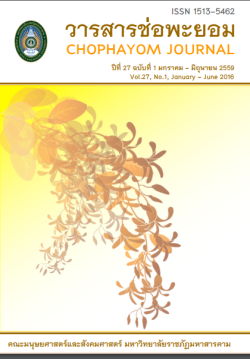การเปรียบเทียบผลการเรียนประเด็นปัญหาทางสังคมที่เกี่ยวข้องกับการใช้วิทยาศาสตร์โดยใช้การเรียนแบบผสมผสานตามวิธีการทางวิทยาศาสตร์ กับการเรียนแบบผสมผสานตามวัฏจักรการเรียนรู้ 7 ขั้นที่มีผลต่อความสามารถในการโต้แย้งและการคิดเชิงเหตุผลของนักเรียนระดับประกาศนียบัตร
Abstract
บทคัดย่อ
การเปรียบเทียบผลการเรียนประเด็นปัญหาทางสังคมที่เกี่ยวข้องกับการใช้วิทยาศาสตร์โดยใช้การเรียนแบบผสมผสานตามวิธีการทางวิทยาศาสตร์ กับการเรียนแบบผสมผสานตามวัฏจักรการเรียนรู้ 7 ขั้นที่มีผลต่อความสามารถในการโต้แย้งและการคิดเชิงเหตุผลของนักเรียนระดับปรการวิจัยในครั้งนี้มีวัตถุประสงค์ เพื่อเปรียบเทียบความสามารถในการโต้แย้งและการคิดเชิงเหตุผลหลังเรียนประเด็นปัญหาทางสังคมที่เกี่ยวข้องกับการใช้วิทยาศาสตร์ของนักเรียนโดยส่วนรวม จำแนกตามผลการเรียน และรูปแบบการเรียน กลุ่มตัวอย่างเป็นนักเรียนระดับประกาศนียบัตรวิชาชีพ (ปวช.) ชั้นปีที่ 1 จำนวน 60 คน โดยแบ่งนักเรียนออกเป็น 2 กลุ่ม ได้แก่ กลุ่มทดลองที่ 1 จำนวน 30 คน โดยใช้รูปแบบการเรียนแบบผสมผสานตามวิธีการทางวิทยาศาสตร์ กลุ่มทดลองที่ 2 จำนวน จำนวน 30 คน โดยใช้รูปแบบการเรียนแบบผสมผสานตามวัฏจักรการเรียนรู้ 7 ขั้น เครื่องมือที่ใช้ในการวิจัย ประกอบด้วย แผนการจัดการเรียนรู้ประเด็นปัญหาทางสังคมที่เกี่ยวข้องกับการใช้วิทยาศาสตร์ที่เรียนโดยใช้รูปแบบการเรียนแบบผสมผสานตามวิธีการทางวิทยาศาสตร์และแผนการจัดการเรียนรู้ที่เรียนแบบผสมผสานตามวัฏจักรการเรียนรู้ 7 ขั้น อย่างละ 3 แผน ตามประเด็น 3 ประเด็น คือ พืชดัดแปลงพันธุกรรม การคัดลอกพันธุกรรม และภาวะโลกร้อน แบบประเมินความสามารถในการโต้แย้ง และแบบทดสอบวัดการคิดเชิงเหตุผล การทดสอบสมมติฐาน Paired t-test และ F-test (Two-way ANCOVA และ Two-way MANCOVA)
ผลการวิจัยพบว่า นักเรียนโดยรวม และจำแนกตามผลการเรียนที่เรียนประเด็นปัญหาทางสังคมที่เกี่ยวข้องกับการใช้วิทยาศาสตร์โดยใช้การเรียนแบบผสมผสานตามวิธีการทางวิทยาศาสตร์และนักเรียนที่ใช้รูปแบบการเรียนผสมผสานตามวัฏจักรการเรียนรู้ 7 ขั้น มีการพัฒนาความสามารถในการโต้แย้งเพิ่มขึ้นจากการสอบครั้งที่ 1-4 และมีการคิดเชิงเหตุผลโดยรวมและรายด้าน 2 ด้าน คือ ด้านอุปนัยและด้านนิรนัยเพิ่มขึ้นจากก่อนเรียน (p<.001) นักเรียนที่มีผลการเรียนวิทยาศาสตร์สูงหลังเรียนประเด็นปัญหาทางสังคมที่เกี่ยวข้องกับการใช้วิทยาศาสตร์ มีเฉพาะการคิด เชิงเหตุผลโดยรวมเป็นรายด้านทั้ง 2 ด้านมากกว่านักเรียนที่มีผลการเรียนวิทยาศาสตร์ต่า (p≤.001) ส่วนนักเรียนที่เรียนด้วยการเรียนแบบผสมผสานตามวัฏจักรการเรียนรู้ 7 ขั้นมีเฉพาะการคิดเชิงเหตุผลโดยรวมและรายด้านทั้งสองด้านมากกว่านักเรียนที่เรียนด้วยรูปแบบการเรียนแบบผสมผสานกาศนียบัตรวิชาชีพชั้นปีที่ 1 ที่มีผลการเรียนวิทยาศาสตร์ต่างกันตามวิธีการทางวิทยาศาสตร์ (p<.001)และมีปฏิสัมพันธ์ระหว่างผลการเรียนกับรูปแบบการเรียนเฉพาะการคิดเชิงเหตุผลด้านนิรนัย (p<.046)
Abstract
Science teaching and learning should be organized relevant to contextual life of students, particularly the socioscientific issues which could develop argumentation and higher – order thinking of the student . Also , it could develop the students’ social responsibility as citizens in the democratic society. This study aimed to compare effects of learning socioscientific issues using the mixed methods based on the scientific method and the 7E-learning cycle approach on argumentation and logical thinking of the 60 first year vocational certificate students with different science learning outcomes. The students were selected using the cluster random sampling technique and divided into 2 groups : (1) a group of 30 students learned using the mixed methods based on the scientific method and (2) a group of 30 students using the mixed methods based on the 7-E learning cycle approach. Instruments for the research included : 1) learning plans on 3 socioscientific issues: Genetically Modified Plants ,Cloning and Global Warming ; for the two experimental classes , 3 plans each and each plan for 3 hours of learning in a week ; 2) 4 argumentation tests, 4 items each; and 3) the logical thinking test with 30 items and two areas , induction and deduction . The collected data were analyzed for testing hypotheses by means of the Paired t-test and the F-test (Two-way MANCOVA and ANCOVA)
The research findings revealed that the students as a whole and as classified according to science learning outcomes after learning socioscientific issues using the mixed methods based on the scientific method and the mixed methods based on the 7E-learning cycle method showed developments of argumentation abilities from the 1st to the 4 th test and showed gains in logical thinking in overall and in the areas of induction and deduction from before learning (p<.001). The high science achievers indicated more only logical thinking in general and 2 areas than did the low science achievers (p<.001) . Also the students learned using the mixed method based on the 7E –learning cycle method indicated more only logical thinking in general and 2 areas than did the students learned using the mixed method based on the scientific method.(p<.001). In addition ,there was the statistical interaction of science learning achievement with learning method only on the deduction area (p<.046).






